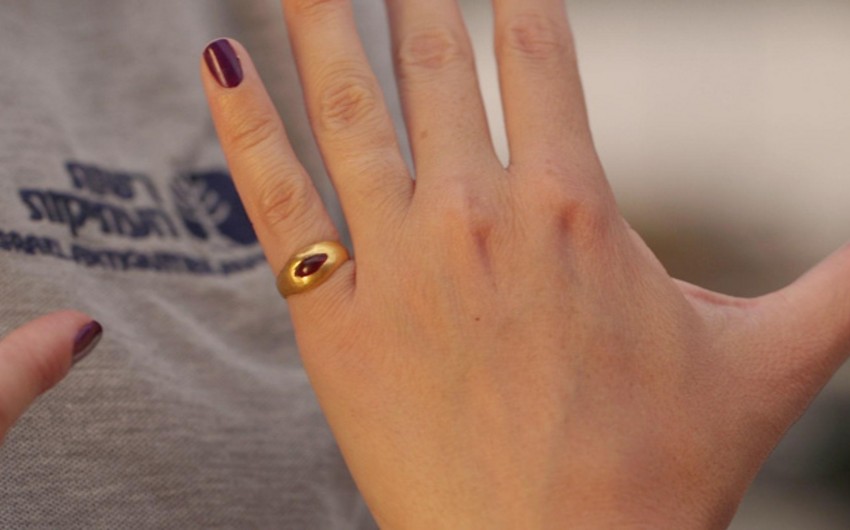Archaeologists recently discovered a rare 2,300-year-old gold ring while excavating in the parking lot of the City of David in Jerusalem, the Israel Antiquities Authority (IAA) said, Report informs via The Times of Israel.
The “exceedingly well-preserved” ring is set with a red garnet and given its small diameter, was likely made for a child, the IAA said in a statement. The ring, which “since its last use 2,300 years ago accumulated neither rust nor suffered other weatherings of time,” dates from the early Hellenistic era in Jerusalem, around the 3rd or 4th century BCE.
The ring was manufactured by “hammering thin pre-cut gold leaves onto a metal ring base,” the statement said. During this period, gold jewelry with set stones, instead of decorated gold, became fashionable. Gold and other luxury items became more popular in the Hellenistic world after Alexander the Great’s conquests in the late 4th century BCE, which eased transport and trade.
“I was sifting earth through the screen and suddenly saw something glitter. I immediately yelled, ‘I found a ring, I found a ring!’” recalled excavation team member Tehiya Gangate. “Within seconds everyone gathered around me… This is an emotionally moving find, not the kind you find every day.”
The ring is one of several early Hellenistic period ornaments recently found during the ongoing excavations at the Givati Parking Lot, undertaken by a joint Israel Antiquities Authority-Tel Aviv University team. The dig has also found buildings dating from the same period.
“The Givati Parking Lot excavation finds are beginning to paint a new picture of the nature and stature of Jerusalem’s inhabitants in the early Hellenistic Period,” said Prof. Yuval Gadot of Tel Aviv University.
Scholars have usually assumed that Jerusalem at the time was a small, somewhat provincial town, but the new discoveries show “an entire neighborhood… The character of the buildings – and now of course, the gold finds and other discoveries display the city’s healthy economy and even its elite status. It certainly seems that the city’s residents were open to the widespread Hellenistic style and influences prevalent also in the eastern Mediterranean Basin,” Gadot said.
The ring, along with other recent discoveries, will be available for viewing by the public at an upcoming conference, “Jerusalem Mysteries — The Archaeology of Jerusalem,” to be held June 4 on the eve of Jerusalem Day at IAA headquarters in Jerusalem.


 https://static.report.az/photo/fb33216b-c831-3ab5-a36a-f0a777db6dd0.jpg
https://static.report.az/photo/fb33216b-c831-3ab5-a36a-f0a777db6dd0.jpg

